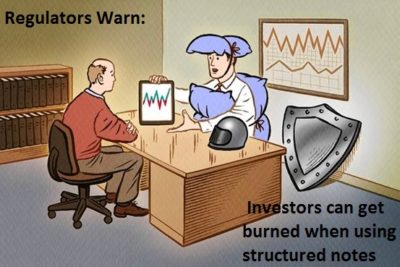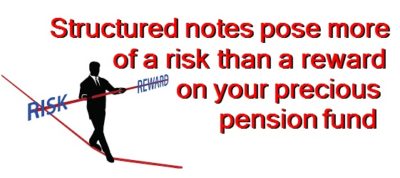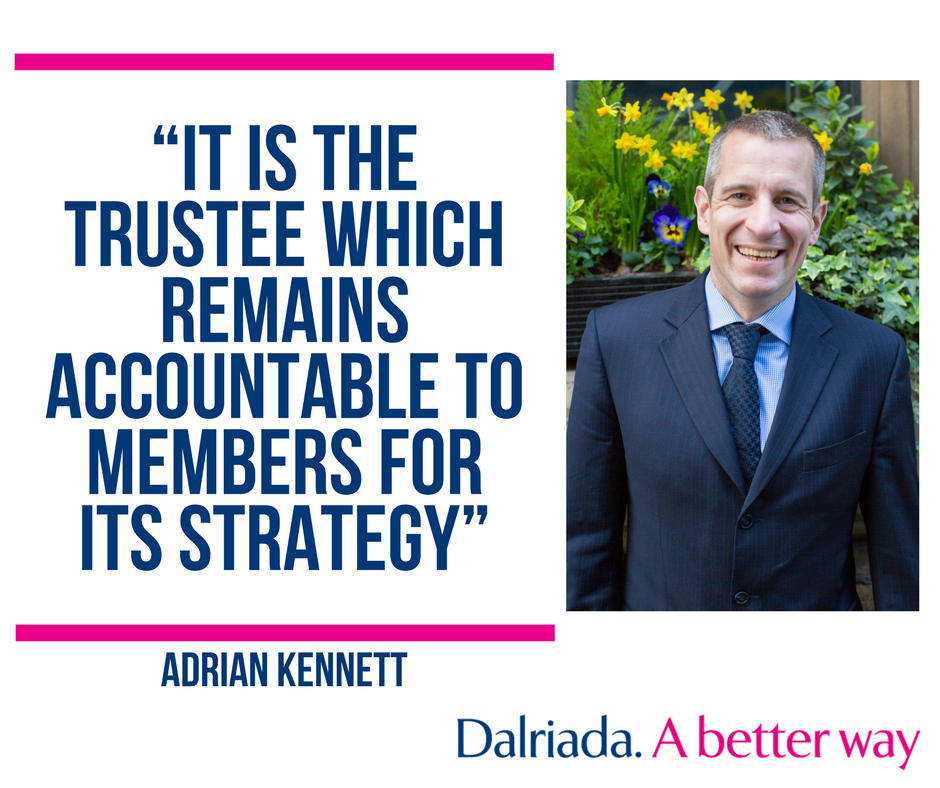In many pension scams, we see the use of totally unsuitable, high-risk, for-professional-investor-only structured notes. These notes often offer the introducer high commissions. However, they are risky, fixed-term investments that often end in the loss of some – or even all – of the fund invested. Therefore, these types of investments are totally unsuitable for a pension fund. Firstly, let me explain what a structured note is, and then we can go through structured notes – knowing the risks.
So what the hell are structured notes? And why should retail investors say NO to them?
A structured note is an IOU from an investment bank that uses derivatives to create exposure to one or more investments. For example, you can have a structured note betting on the S&P 500 Price Index, the Emerging Market Price Index, or both. The combinations are almost limitless.
A pension fund is referred to as a retail investment, so it should be placed in a low to medium risk investment. Generally, structured notes are labeled high-risk, for professional investors only and, therefore, no pension fund should ever be invested into them.

Structured notes are frequently peddled by less-scrupulous financial advisers – as well as outright scammers – as a “high-yield, low-risk”, supposedly backdoor way to own stocks. However, regulators have warned that investors can get burned – which they frequently do. If the investment banks can flog it, they will make just about any toxic cocktail you can dream up. In reality, a structured note is an unsecured debt issued by a bank or brokerage firm – and the amount of money the investor might (or might not) get back is pegged to the performance of stocks or broad market indexes.
Say NO to structured notes for pensions!
With structured notes, there is no capital protection; no flexibility; no portfolio enhancement; no increased returns and no limit to the risk of loss of capital.
In the case of CWM, 1,000 people with 100 million pounds, were invested in structured notes and many of them lost large chunks of their funds. The CWM scam, headed by Darren Kirby, used structured notes with Commerzbank, Nomura, RBC and Leonteq, and many of the notes crashed.
John Rodgers fell victim to the CWM scam after being cold called by a salesman called Dean Stogsdill . His £202,000 pension pot was invested into high-risk, professional-investor-only structured notes referred to as “Blue Chip Notes”. Today John’s pension fund is worth just £60,000 (if he is lucky).
OMI help facilitate the unqualified, unlicensed and unregulated CWM scammers – victims of this scam were also tied into a useless, pointless insurance bond for ten years – courtesy of OMI. Whilst the value of these pension funds steadily plummeted, OMI stood idly by and watched it happen.

In the case of the Continental Wealth Management scam, the life offices – Old Mutual International, SEB and Generali, invested up to 1,000 victims’ life savings in structured notes. The majority of these toxic notes were from Commerzbank, Royal Bank of Canada, Nomura and Leonteq – some of which were, allegedly, fraudulent. Victims are facing huge losses – and a few have had their retirement savings wiped out entirely and a couple are now in negative territory due to the parasitic life offices continuing to take their quarterly fees (based on the original investment) as the investors are trapped into these spurious “bonds” for up to ten years.




The problem I have with this blog is it’s not balanced. It slams the “structured product” without understanding.
One could argue “Say NO to PROPERTY” on the back of property related scams, yet property has often been a solid (pun intended) asset class providing regular income. However, there have been many scams enticing the unwary into property – Cape Verde, LM Managed Performance to name just two. The Blackmore Bond plc – https://beta.companieshouse.gov.uk/company/10273135 – on the face of it seems transparent and to invest in decent assets – properties – and you might think was a safe investment. However it is being managed by people on record to have participated in known scams – Capita Oak & Henley and its latest accounts show it has a potential cash flow problem – it is dependent on a continuous £1.5m per month new subscriptions or it cannot meet its commitments and goes under. It walks on a knife edge. It is also dependent on a high margin on the resale of its properties. A small perturbation in the economic conditions and this fund falls off the knife edge. It isn’t the asset in this case that’s the high risk but the management of the fund. Would you invest in a fund managed by Del Boy – how about two Del Boys?
There are however good, honest, reliable funds that invest in property of all types from shopping malls to office blocks, warehouses etc. etc.
So, it isn’t the “product” or asset (although Structured products are not considered an asset class but one means of accessing an asset) that’s the real issue – it’s the FRAUDULENT advice by the scammers to invest heavily in BADLY MANAGED – or fraudulent even in the case of LM – funds. The problem is the “con” that sticks 100% of a victim’s pension into just one or two risky products that gives the adviser the most commission with zero consideration to client’s best interest.
In the UK, 97% of the time structured products have paid out and not lost the investor money. That’s a decent bet imho.
Yes they are complex, yes consumers don’t understand them and wouldn’t know how to pick one over another. However, Structured Products can have a place in a BALANCED portfolio IF you get the RIGHT professional advice. The keyword is BALANCED! Every scam has ONE common denominator – they are UNBALANCED investments in UNREGULATED funds. They put too high a percentage of a victim’s pension in just one or two unregulated funds. No self respecting adviser would do that. The FCA advises no more than 15% of a portfolio in structured products. Good advisers will a) stick to the FCA recommendation and b) select better structured products just like they would select other asset classes for a client’s portfolio depending on the client’s needs.
https://www.fca.org.uk/consumers/structured-products
https://www.fca.org.uk/publications/thematic-reviews/tr15-2-structured-products-thematic-review-product-development-and
https://www.moneyadviceservice.org.uk/en/articles/structured-deposits-and-investment-products
https://www.sharesmagazine.co.uk/article/understanding-structured-products
They may be a good choice for SOME people, in SOME circumstances – but definitely not in a Pension which should be low risk. They are for people who have a good understanding of investments , usually HNWI – not pension pots of £50k.
The risk is for the owner of the pension pot to decide. Different people have different risk profiles. A young person with decades in front of them might fit a higher risk profile to someone nearing retirement. So their pension pot doesn’t have to be “low risk”. Moreover 15% of a portfolio in structured products (FCA recommended upper limit) might fit the risk profile of someone willing to take more than just the low risk option. That’s why we pay financial advisers!
What is irritating me is the broad brush approach with “Say NO to structured products” – as in ALL structured products everywhere.
It is unreasonable to assert this is just for HNW investors – which is a clearly defined term in the UK. A properly regulated professional adviser, familiar with these investment vehicles is the person to advise whether you should or shouldn’t. Structured products in the UK are not prohibited by the FCA to be offered to retail clients, so by definition, are not limited to Sophisticated or HNW investors. Fact.
The issue is here is some people were mis-advised to invest large proportions (sometimes 100%) of their pensions in unregulated offshore structured products that are way riskier than those offered in the UK. This is the same with all unregulated funds scammers use. It’s the scam that’s the issue. We shouldn’t just tar ALL structured products with the same brush, in much the same way we don’t tar ALL investment funds with the same brush just because some people got mis-advised to invest in offshore unregulated collectives.
No one has yet blogged: “Say NO to collective investment funds” – it’s the regulated nature that we say NO to. No one would think of asserting “say NO to property” – we generally all own a house! But there are unregulated offshore property funds that have proved disastrous.
It should really be “say NO to offshore unregulated structured products advised by unregulated advisers!”
That’s the correct message.
That’s the point I am making.
Stephen is correct. Much as I agree with the sentiment expressed in this article, it is very flawed and certainly false in parts.
I myself do not like structured notes and would not buy any type for myself. There are however many different types. Some of the biggest and best known UK banks have promoted structured notes (structured products) and some DO offer capital protection, often 100% at the end of the term. They are promoted as ‘low risk’ and they are…….providing the counterparty does not go bust. I know people who are happier with this type of investment than a ‘direct’ stockmarket investment as they have a guarantee that as a minimum they will receive a return of invested capital. It’s not for me but it is difficult to say these do not have a place for the cautious investor.
Other structured notes are the equivalent of a bet on a horse, and a rank outsider at that! Most horses lose and any adviser who invests somebody’s pension pot in esoteric structured notes with no or limited capital protection needs to spend the rest of their life behind bars. Of course it is all done for commission, payable on both the bond wrapper and the toxic notes therein. The wilful blindness of the life offices and regulators to what is going on is utterly scandalous.
I only post this as I did think the ‘broad brush’ statements made were a bit like (sorry) scaremongering. It helps us in fighting the good fight if we get all of our facts right!
@Ian, Well said.
Two points to note, first, “providing the counterparty doesn’t go bust” . As mentioned, in the UK the counterparty is often one of the big banks are like HSBC – unlikely to go bust.
The other point is the return is dependent on the performance of some underlying asset, over a period of time, such as the FTSE. The issue with some of these offshore risky products (called notes in the article above) is the counterparty might not be so strong and sometimes they use two underlying assets and it’s whichever performs the lowest of the two that is used to determine the return.
These offshore products might even be specifically designed to fail – i.e. deliberately constructed so you will lose all your investment. I don’t know, I haven’t researched them but hey, a great way of openly stealing money and blaming the victim – which is exactly what happened. That, by the way might be a better blog – showing those structured notes were deliberately designed so the investor would lose all their money AND how that must have been obvious to the insurance companies at the material time!
There’s a What Investment – a reputable UK publication – Guide http://www.whatinvestment.co.uk/the-what-investment-guide-to-structured-products-2395287/
Yes, they can be described as complex but to many people ANY stock market investment is complex, daunting and risky, requiring a bit of research and some knowledge on selecting value rather than some random hit & miss approach.
Henry Tapper wrote a blog recently about empowering consumers and looked at NEST (the workplace pension set up by the Government) and said that most people just took the default. Picking the default could be explained because the default is an easy option and most people do “easy”. They don’t do “complex”. That’s why we pay financial advisers. Many retail clients haven’t got a clue – crikey, many people even buy a car based on just its colour!
The problem is the authorities allow sharks to pose, fraudulently, as regulated advisers who give bad advice and recommend risky offshore products paying high commissions. Some big Insurance companies – some already exposed on Angie’s site – instead of being trusted gatekeepers, are/were letting these sharks half inch the pensions of the vulnerable by enabling the scams and the FCA is allowing them to do it!
I definitely hold the view these “trusted gatekeepers” knew exactly what was going on and simply ignored it because they were getting a decent slice of the scam pie for doing next to nothing, all at the expense of the vulnerable victim – i.e. complicit.
Structured Notes are categorised as ‘standard assets’ within pension funds by the FCA.
Good to see the focus on these unsuitable investments for individuals.
I am embarrassed to say that at being 55 years old, with a low risk requirement, the “friend of a friend” at DeVere in the UAE put 40% of my pension transfer into 2 structured products with their Trustee STM.
After being ignored then brushed off by the management at DeVere UAE I challenged Nigel Green directly as to the unsuitability of the products and the poor regard to my circumstances. I then offered DeVere the chance to put me back to where I was so we could move on. This was refused point blank and I was told that they simply carried out my instructions and the Trustee must have been happy!!!
Then after a few remarks by me on social media I was served a cease and desist order with the threat of fines and prison by Nigel Greens UAE law firm!
I now understand that I am not the only person to be put into these products and 5 years on I am looking at a substantial loss in my pot which will significantly impact retirement plans.
I therefore echo the remarks by Kim regards Structured Products and hope that one day DeVere will be held to account for the misery they have caused me and others in the UAE.